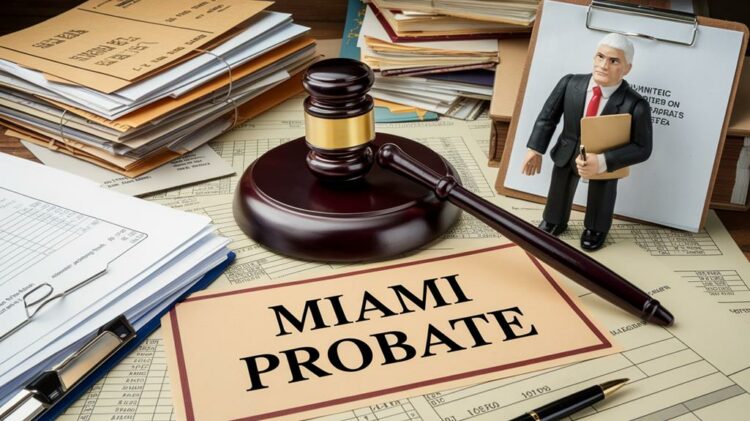When someone passes away in Miami, their will often names a special helper called an executor. This person has a big job to do during the probate process.
The executor’s main tasks are to find all the things the person who died owned, pay any bills they left behind, and give out what’s left to the people mentioned in the will.
In Florida, executors get paid based on rules set by the state. If they think they should get more money for their work, they can ask for it. Sometimes, executors choose not to get paid at all, especially if they’re getting something from the will themselves.
It’s really important for executors to know all about their duties and how they might be paid. This helps them handle the tricky parts of Miami probate cases.
Key Takeaways
- When someone passes away in Miami, an executor helps take care of their belongings and money. This person has important jobs to do. They find everything the person owned, pay any bills they left behind, and give what’s left to the people who should get it.
- Executors can get paid for their work. In Florida, there are rules about how much they can earn. The amount depends on how much the person’s stuff is worth. For example, they might get 3% of the first million dollars, but only 1.5% if it’s over ten million dollars.
- Sometimes, the executor might think they deserve more money because the job was really hard. They can ask a judge for extra pay. The judge will look at how much work they did and if it’s fair to give them more.
- In some cases, executors choose not to get paid at all. This might happen if they’re also getting something from the person who died. They might want to make sure everyone gets their share quickly and fairly. It depends on how much work there is, how big the estate is, and how they know the people involved.
The Role of an Executor in Florida Probate
When someone passes away in Florida, a special person called an executor helps take care of their belongings and final wishes. This executor is also known as a personal representative.
The executor has important jobs to do. They find and collect all the things the person who died owned. They also pay any bills the person left behind. Finally, they give out what’s left to the people who are supposed to get it.
This whole process is called probate, and it can be tricky. That’s why many executors ask a Probate Attorney for help. The attorney knows all the rules and can guide the executor.
The executor makes a list of everything the person owned and tells people who might be owed money. They also take care of the person’s stuff until it can be given away. They talk to the people who will get things and make sure all taxes and fees are paid.
In the end, the executor’s job is super important. They make sure the person’s last wishes are followed and everything is done the right way according to Florida’s laws.
 Executor Compensation in Florida
Executor Compensation in Florida
When someone passes away in Florida, an executor helps manage their belongings and money. This person gets paid for their work, based on how much the estate is worth.
The law in Florida says executors can earn 3% of the first $1 million, 2.5% of the next $4 million, and so on. This helps make sure they’re fairly paid for their time and effort.
Sometimes, an executor might think they deserve more money for their work. They can ask for extra pay if they feel it’s needed. On the other hand, some executors choose not to take any money at all, especially if they’re also getting something from the estate.
It’s important for everyone involved to understand how executors are paid. This helps keep things fair and clear during the probate process in Miami and other parts of Florida.
Statutory Compensation Structure
In Florida, when someone passes away, an executor helps manage their money and belongings. The law says how much the executor can be paid for their work.
The amount an executor gets is based on how much the person’s estate is worth. For the first $1 million, they get 3%. Then, for the next $4 million, they get 2.5%. If there’s even more, they get 2% for the next $5 million. Anything over $10 million, they get 1.5%.
The executor doesn’t have to take this money if they don’t want to. Sometimes, if the executor is also getting something from the estate, they might choose not to be paid.
If the executor thinks they should get more money for their work, they can ask for it. But they need to explain why they deserve extra pay.
It’s important for everyone to understand how executors are paid in Florida. This helps make sure everything is fair and clear when someone’s estate is being handled.
Special Compensation
In Florida, executors usually get paid based on set rules. But sometimes, these rules don’t cover all the hard work they do. When this happens, executors can ask the court for special compensation.
To get special compensation, executors need to show the court that the normal pay isn’t enough. This might happen if they have to do extra tasks that most executors don’t do. The court can decide to give them more money if they agree the regular pay doesn’t match how difficult the job was.
There are a few things the court looks at when deciding on special compensation:
- How much work the executor did
- If the normal pay is enough
- If the extra pay is fair
This special pay rule helps make sure executors get paid fairly for all their hard work in taking care of someone’s estate after they die. Probate lawyers and estate lawyers can use this rule to help executors get the right amount of money for their efforts.
 Waiving Compensation
Waiving Compensation
Executors in Florida probate cases can choose not to take any money for their work. This often happens when the executor is also getting something from the estate. They might do this to make sure everyone else gets what they’re supposed to.
In Florida, executors are usually allowed to get paid for managing the deceased person’s stuff during probate. But some kind executors might say no to this money. They want to make sure the estate’s things are given out quickly and fairly.
Deciding to give up payment is a big choice. It depends on how hard the probate job is, how much stuff is in the estate, and how the executor knows the other people involved. Talking to a lawyer who knows about estates in Florida can help executors make the best decision. This way, they can follow what the deceased person wanted and do what’s best for everyone.
Qualifications for Serving as an Executor in Florida
In Florida, being an executor is a big job with special rules. To be an executor, you need to be at least 18 years old and have a clear mind and healthy body. You also can’t have been in trouble with the law for serious crimes.
Usually, executors should live in Florida. But if you’re related to the person who died and live somewhere else, you might still be able to do it.
Good executors are honest, organized, and have enough time to do the job. They need to be willing to work hard and help out. Executors take care of the things the person who died owned and make sure their wishes are followed.
Choosing an executor is really important. The person needs to follow the rules and be good at handling the process in Miami. It’s a big responsibility, so it’s crucial to pick someone who can do it well.
Frequently Asked Questions
What Can an Executor Not Do in Florida?
In Florida, an executor has important jobs after someone dies, but they can’t do everything on their own. They need a judge’s permission to sell the person’s stuff, pay bills, or give things to family members. The executor must be careful with bank accounts and keep good records. They can talk to family members but can’t make big choices alone. If there are problems, they have to ask the judge what to do. The executor must take care of things left behind and can’t decide by themselves how to handle people who say they’re owed money. It’s a big job with lots of rules to follow.
How Long Does an Executor Have to Settle an Estate in Florida?
In Florida, an executor usually has about a year to take care of everything after someone dies. They make a list of what the person owned, give things to family members, pay bills, and handle taxes. The executor follows rules set by the court while doing all this. Sometimes, they can ask for more time if they need it. It’s a big job that helps make sure everything is handled right after someone passes away. The executor’s work is important because it makes sure the person’s final wishes are respected and their belongings are taken care of properly.
What Are the Duties of an Executor of a Will in Florida?
An executor in Florida has many important duties when someone dies. They make a list of everything the person owned and take care of paying taxes and bills. Sometimes, they need to sell things like houses or cars. The executor also handles bank accounts and investments, making sure everything is correct. A big part of their job is giving out the person’s belongings to family or friends, just as the will says. They keep careful records of everything they do and talk to people who might be owed money. It’s a big responsibility, but it helps make sure the person’s final wishes are followed correctly.
Is an Executor Required to Communicate With Beneficiaries in Florida?
In Florida, people called executors have an important job when someone passes away. They need to tell the beneficiaries (the people who will receive things from the person who died) what’s happening.
Executors must let beneficiaries know about important stuff quickly. They also have to be clear about how they’re giving out the things that belonged to the person who died.
It’s really important for executors to keep talking to beneficiaries during the whole process. This helps make sure everyone agrees on what’s happening and keeps the executor from getting into trouble.
Conclusion
When someone passes away in Florida, a special person called an executor helps take care of their belongings. This person has an important job to do. They make sure everything the person owned gets given to the right people, following rules set by the law. Executors can get paid for their work, but the amount can vary. To be an executor in Florida, you need to be a grown-up with a clear mind and a good record. It’s a big responsibility, but it helps make sure everything is fair for the family of the person who died.
If you need help understanding executor duties or are dealing with probate in Florida, Real Estate Law FL is here for you. We can explain what executors do and help you navigate the process. Whether you’re an executor or a family member, our team can guide you through this important task. Don’t face these complicated rules alone! To learn more about how we can help with executor duties and probate, visit Real Estate Law FL. You can also email us or call us to get expert advice on handling a loved one’s estate.

